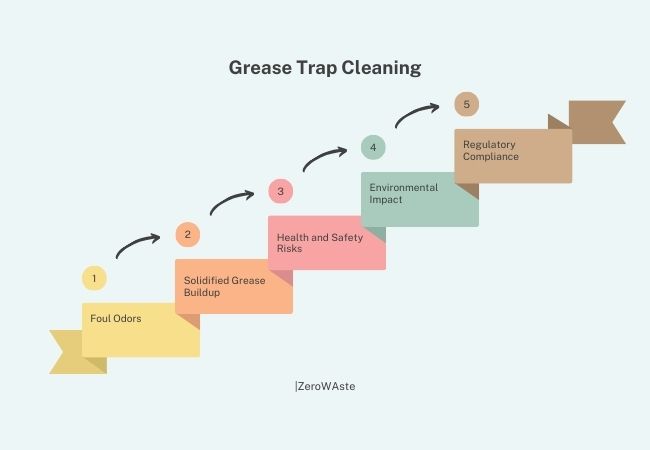Grease Trap Cleaning comes with so many obstacles and a team of cleaning professionals can only ease the way.
We Zerowaste ensure the top-notch cleaning service to pave the way a perfect kitchen for you.
Here in this article we will let you know everything regards to this service we offer.
The Grease Trap Cleaning Challenge
Cleaning grease traps comes with its set of challenges, primarily due to the nature of the substances involved and the potential environmental impact. Here are some common challenges associated with cleaning grease traps:

Foul Odors:
Challenge: Grease traps can emit unpleasant odors, making the cleaning process unpleasant for the individuals involved.
Solution: Proper ventilation and the use of odor-neutralizing agents can help mitigate this challenge.
Solidified Grease Buildup:
Challenge: Over time, grease can solidify, creating a stubborn buildup that is challenging to remove.
Solution: Regular maintenance and the use of effective degreasing agents can help prevent excessive solidification, making the cleaning process more manageable.
Health and Safety Risks:
Challenge: Handling grease and wastewater can pose health and safety risks to individuals involved in the cleaning process.
Solution: The use of personal protective equipment (PPE) and adherence to safety protocols are crucial to minimize these risks.
Environmental Impact:
Challenge: Improper disposal of grease and wastewater can harm the environment, leading to pollution.
Solution: Grease trap cleaning services must follow strict regulations for waste disposal, emphasizing recycling and responsible waste management practices.
Regulatory Compliance:
Challenge: Meeting and staying compliant with local health and environmental regulations can be challenging.
Solution: Regular training for cleaning staff, keeping updated on regulatory changes, and maintaining necessary permits are essential to address this challenge.
Accessibility Issues:
Challenge: Grease traps are often located in confined or hard-to-reach spaces, making access difficult for cleaning.
Solution: Proper planning, the use of appropriate tools, and, if necessary, seeking professional assistance can help overcome accessibility challenges.
Frequency of Cleaning:
Challenge: Determining the optimal frequency for grease trap cleaning can be challenging and varies based on the kitchen's volume and activities.
Solution: Regular inspections and working closely with professionals can help establish an effective cleaning schedule tailored to the specific needs of the kitchen.
Zero Waste Australia's Grease Trap Solutions
Zero Waste Australia recognizes the vital role grease traps play in maintaining the integrity of waste and recycling services. Here's how they are championing responsible FOG management:
Here is how we provide the Grease Trap cleaning service
Step 1: Safety First
Before starting the grease trap cleaning process, ensure the safety of yourself and others. Wear appropriate personal protective equipment (PPE), including gloves and eye protection. Additionally, make sure the kitchen area is well-ventilated.
Step 2: Locate the Grease Trap
Identify the location of the grease trap in your commercial kitchen. It is typically situated near the sink or dishwasher. If you are unsure, refer to the kitchen's plumbing diagram or consult with a professional.
Step 3: Disconnect Power
If your grease trap is connected to any electrical appliances, such as a garbage disposal unit, disconnect the power to ensure safety during the cleaning process.
Step 4: Remove the Lid
Using a wrench, carefully remove the lid of the grease trap. Take caution not to drop any tools or debris into the trap, as this can complicate the cleaning process.
Step 5: Scrape off Solid Debris
Once the lid is removed, use a scraper to gently remove any solid debris from the surface of the grease trap. Dispose of this waste in a designated trash receptacle.
Step 6: Empty the Trap
With the solid debris removed, use a bucket to scoop out the accumulated grease and wastewater from the trap. Dispose of this material properly according to local regulations.
Step 7: Clean with Degreasing Agent
Apply a degreasing agent to the interior surfaces of the grease trap. Follow the product's instructions for the recommended contact time. This step helps break down residual grease and ensures a thorough cleaning.
Step 8: Rinse and Reassemble
Using a hose, rinse the grease trap thoroughly to remove any remaining degreasing agent. Once cleaned, reassemble the trap, ensuring all components are securely in place.
Why Choose Zero Waste Australia for Grease Trap Services?
Our trained professionals ensure a swift and thorough cleaning process.
Rest easy knowing that we operate within all safety and environmental regulations.
Eco-Friendly Degreasing
We use specially formulated, eco-friendly degreasing agents that effectively break down grease without harming the environment. Say goodbye to harsh chemicals and hello to a greener clean!
Safety Equipment
Our team wears state-of-the-art personal protective equipment (PPE) to guarantee their safety and the safety of your kitchen staff.
Waste Segregation
Our team is trained to segregate waste on-site, ensuring that recyclable materials are separated from non-recyclables. This means less waste heading to landfills and a smaller environmental footprint for your kitchen.
Responsible Disposal
EcoClean Solutions adheres to strict waste disposal regulations. We ensure that all waste, especially grease and wastewater, is disposed of responsibly and in compliance with local environmental standards.